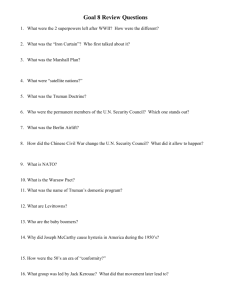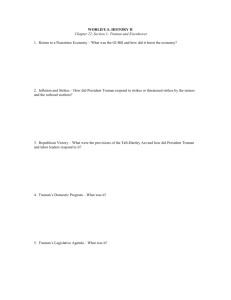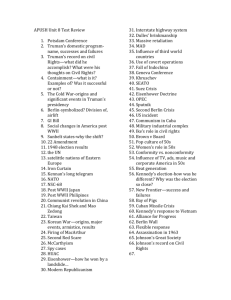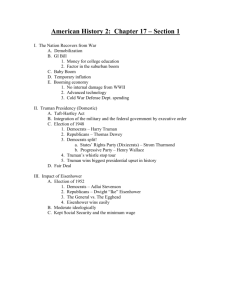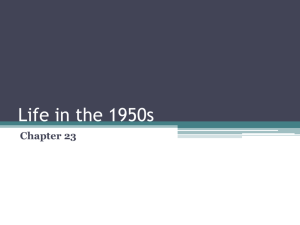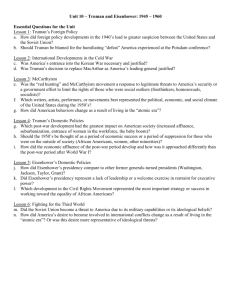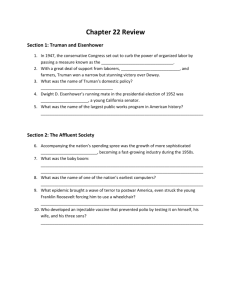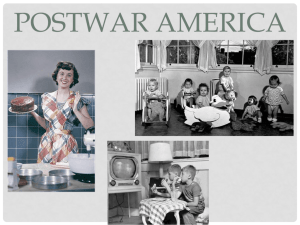Postwar America
advertisement
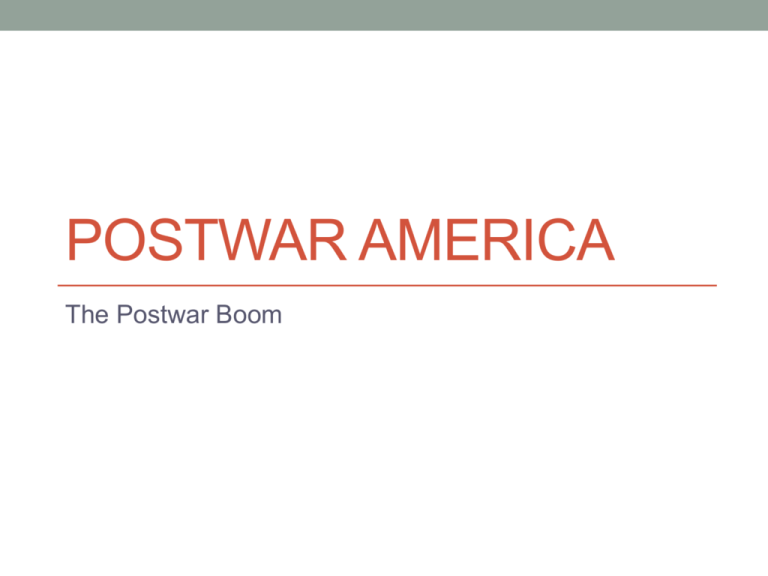
POSTWAR AMERICA The Postwar Boom Review • Race for the H-bomb • Policy of Brinkmanship • CIA • Warsaw Pact • Eisenhower Doctrine • Khrushchev takes over following Stalin • Race in space Main Idea • The Truman and Eisenhower administrations led the nation to make social, economic, and political adjustments following World War II. • Why it matters now • In the years after World War II, The United States became the economic and military power that it is today Objectives • Identify social and economic problems America faced after WWII. • Describe causes and effects of social unrest in the Postwar period • Contrast domestic policy under Truman and Eisenhower. Readjustment and Recovery • Social life changes after the war • GI Bill – A way to ease soldiers back into civilian life by helping pay for tuition and unemployment • Housing crisis forced the development of suburbs (small residential communities surrounding cities) • Divorce rates went way up following the war Economic Readjustment • The US converted from a wartime economy to a peacetime economy • Contracts with war industries ended immediately leaving many unemployed • The price of consumer goods soared after the war • Government stepped in to control wages and prices Recovery • Economists were predicting a depression following the war • They didn’t take into account that people were ready to splurge after going through the Depression • The Cold War contributed to economic growth • Marshall Plan produced strong foreign markets Move toward Conservatism • When Truman took over for FDR he faced problems in the • • • • labor market Strikes were a problem following the war Truman was usually a fan of organized labor but he threatened to draft all strikers into the military The Unions called off the strikes Disgusted by shortages of goods, rising inflation, and labor strikes the country started to want a change… Checkpoint • Identify one social problem America faced following WWII. Identify one economic problem America faced following WWII. • One social problem America faced following WWII was . • One economic problem America faced following WWII was . Social Unrest Continues • African Americans that • • • • served in WWII come back demanding rights Truman supported civil rights He pushed for anti-lynching laws, removal of the poll tax, and a permanent civil rights committee in the White House Congress rejected all of these measures Truman steps in by forcing the military to stop segregation and he forced the government to start hiring people of different ethnicities 1948 Election • The Democrats nominated Truman in 48’ • Southern Democrats, known as dixiecrats, were upset with Truman and his push for civil rights • They formed their own party (States’ Rights Democratic Party) • Truman stuns everybody by winning • Fair Deal – extension of FDR’s New Deal Checkpoint • Why did the Democratic Truman lose support in his own party in the South? • Truman lost support in the South because . Republicans Take the Middle of the Road • BY 1951 Truman had lost a lot of support due to the stalemate of the Korean War and McCarthyism… He decided to not run for reelection in 1952 • Republicans nominate Dwight D. Eisenhower (war hero) running on “I like Ike” • Ike’s chances took a hit when his running mate, Nixon, was accused of taking money from a slush fund • Nixon used television to make an appeal to the nation Eisenhower’s Policies • Eisenhower called his approach “dynamic conservatism” AKA “Modern Republicanism” • Eisenhower chose a “middle of the road” approach to politics trying to stay away from controversial issues (Civil Rights) • Eisenhower’s goals were to balance the budget and cut taxes Checkpoint • How was Truman’s approach to politics different than Eisenhower’s? • Truman focused more on during his presidency, while Eisenhower was more concerned with .
